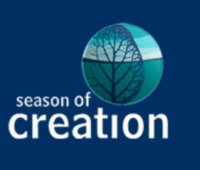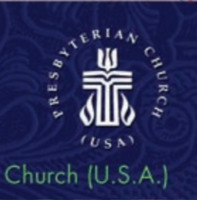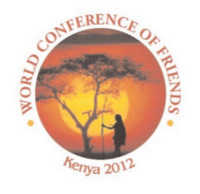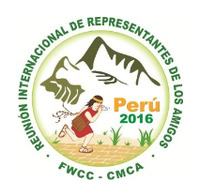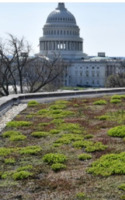Search
39 items
-
Season of Creation Calendar 2018-2020
The Uniting Church in Australia, Synod of Victoria and Tasmania has put forth a revised Season of Creation Calendar that is more inclusive of traditions and cultures from both domestic and international faith groups. In addition to the calendar dates, a calendar statement is included, calling for an ecological conversion along with a celebratory message of "Creation Day." -
Earth Day statement from ELCA presiding bishop
The Reverend Elizabeth A. Eaton, Presiding Bishop of the Evangelical Lutheran Church in America (ELCA), issued an Earth Day statement on behalf of the ELCA. A salient excerpt from the statement is shown below:
"The effects of the warming climate are felt in nearly every corner of the globe. These include increased migration, food insecurity due to changing agricultural landscapes, national security issues and health problems. As bad as it is for all creation, the most vulnerable people around the world are suffering the most. Yet they have contributed the least and, as noted in the United Nation's 2030 Agenda for Sustainable Development,[iii] are ill equipped to adapt to or mitigate the effects of a changing climate to build resilient communities." -
Presbyterians and Climate Change
This article posted on Yale Climate Connections discusses grassroots efforts of Presbyterian organizations, and notes specific time frames of salient Presbyterian accomplishments with regard to climate change. The following excerpt provides a general overview of their goals and mission:
"Presbyterians are engaged in many activities to combat climate change, from Earth Forums to hunger programs addressing food and climate crises and protests against practices that encourage reliance on coal. Since 2010, the Presbyterian Church has given 80 congregations an Earth Care Congregation Certification for demonstrating a strong commitment to environmental care." -
PC(USA) Collaborative Agenda on Environmental Stewardship
Chief executives of the six churches of the Presbyterian Church (U.S.A.) provide their rationale for creating the Collaborative Agenda on Environmental Stewardship:
"Noting the deep concern about urgent environmental challenges expressed by many commissioners at the 221st General Assembly (2014), chief executives of the six agencies of the Presbyterian Church (U.S.A.) appointed a working group to develop a joint response. The group consisting of at least one staff member per agency—was asked to craft a positive statement of what each agency, and the agencies together, have done and plan to do regarding environmental stewardship. This document is designed to call attention to ongoing efforts by the PC(USA) to confront the underlying causes of climate change, and to resources available through the six agencies to congregations, mid councils, and other mission and ministry groups wishing to join in the effort. The working group, meeting together regularly over a period of nine months, has produced the following document— 'Collaborative Agenda on Environmental Stewardship.' It has been reviewed by each of the agency boards, which have each endorsed the document as a whole and recommended that the General Assembly also endorse it as a helpful resource to the whole denomination. This effort is particularly noteworthy as it is unusual for an item of business to come to the assembly from a collaboration of all six agencies." -
Blessed Tomorrow - Caring for Creation Today - Commitment to Act on Climate Change
The Presbyterian Church acknowledges that burning fossil fuels can cause irreparable damage to the Earth and to humans, with a disproportionate impact on the poor and vulnerable, and advocate instead for cleaner energy sources. They emphasize that care for creation is not a political, economic, or scientific issue, but rather a moral responsibility laid before us by God. For this reason, they are partnering with Blessed Tomorrow, to facilitate the creation of new tools and guides that will help to create a more sustainable future. -
Solar
The Presbyterian Church has put forth the following webinar, providing some suggestions for both individuals and congregations to utilize cleaner sources of energy and reduce costs. The introduction is to the webinar is shown below:
"As the realities of climate change present an ever increasing urgency to our need to act faithfully in our energy consumption, many Presbyterians are exploring ways to support, purchase, and share renewable energy resources as an alternative to fossil fuel energy. From Presbyterian congregations drawing interest from the passers-by that notice solar panels on their rooftops, to a Presbyterian teen purchasing solar panels to charge his electric lawnmower (part of his carbon-neutral lawn-care service), the time is ripe to explore the options of solar energy as part of our Christian discipleship." -
Climate Change
The Presbyterian Church has put forth this video on care for creation, emphasizing that Christ has called us to go out into the world to care for creation and our fellow humans, especially the poor. The Union of Concerned Scientists has identified food, transportation, and energy as three key areas of focus to help stem climate change Congregations can help by implementing energy saving techniques, participate in recycling and composting waste, teaching children to grow food, and incorporating salient creation care concepts within educational settings. -
The Power to Change
The 218th General Assembly of the Presbyterian Church U.S.A. (PCUSA) has put forth this resolution on energy and climate change as a resource for both individuals and entire congregations. Topics at the forefront of the report include: global warming, eco-justice norms, energy guidelines, non-renewable energy sources, and alternative and renewable energy sources. The final section includes resources for education, action and advocacy. -
Globalization and the Environment
This study paper by Dr. Robert L. Stivers focuses on various types of attitudes and perspectives regarding human interaction with the environment. He maintains that environmental degradation has multiple causes, of which globalization might only be one factor. Dr. Stivers offers that globalization is a contributor to the extent that affluent individuals from around the world have yet to curb their spending habits and attitudes with regard its negative impact on nature. -
We Are What We Eat
The 214th General Assembly (2002) Presbyterian Church (U.S.A.) approved the following report titled We Are What We Eat. This report focuses on how people can influence the agriculture revolution with regard to sustainability, stewardship compassion, and community. The final section provides suggestions for activities and studies that congregations can engage in with regard to food production/consumption. -
Restoring Creation for Ecology and Justice
This report was adopted by the 202nd General Assembly (1990) Presbyterian Church (U.S.A.). Their Committee on Social Witness Policy urges the assembly to adopt specified policies within the document. The report covers of multitude of critical environmental issues, with sound policy recommendations and actions that congregations can take to support the myriad of sustainability issues. -
A Shared Quaker Statement: Facing the Challenge of Climate Change
This statement calls for leaders to make sound decisions with regard to climate change, and for all people to cherish the Earth for future generations. The following introductory section highlights the sense of urgency:
"As Quakers, we understand anthropogenic climate change (climate change due to human activities) to be a symptom of a greater challenge: how to live sustainable and justly on this Earth.
We recognize that the current rise of greenhouse gas emissions is leading to an unprecedented rate of increase in global average surface temperature of extreme detriment to the Earth’s ecosystems and species, including human beings.
We recognize that catastrophic global climate change is not inevitable if we choose to act urgently." -
A Quaker Response to the Crisis of Climate Change
A Quaker Response to the Crisis of Climate Change discusses how climate change and consumer waste negatively impacts disadvantage populations the most. The first two paragraphs of the introduction are stated below:
"The crisis of global climate change represents a supreme test of humanity’s collective wisdom and courage. Our immoderate use of the Earth’s resources violates the entire biosphere, threatening the lives of millions of people and the habitats of thousands of species. Many of the poorest people are already suffering a changed climate; they are
asking us all to act.
How has humanity produced this crisis? Our faith response is that prevailing social values have obscured what it means to live authentically on this Earth. In rich European countries we consume more than we need within an economic system that divides us as a society; in much that we do, we cause harm to the planet and each other without enriching our lives." -
The Kabarak Call for Peace and Ecojustice
The Kabarak Call for Peace and Ecojustice, at the World Conference of Friends in 2012, maintains that we live in times in which the Earth can not replenish itself, so we must intervene where we can. In addition, we need to look out for our fellow humans, especially those who are less fortunate than us. The following paragraph provides the introduction to the text:
"In past times God’s Creation restored itself. Now humanity dominates, our growing population consuming more resources than nature can replace. We must change, we must become careful stewards of all life. Earthcare unites traditional Quaker testimonies: peace, equality, simplicity, love, integrity, and justice. Jesus said, 'As you have done unto the least… you have done unto me'. We are called to work for the peaceable Kingdom of God on the whole earth, in right sharing with all peoples. However few our numbers, we are called to be the salt that flavours and preserves, to be a light in the darkness of greed and destruction."
-
FWCC Sustainability Minute
This minute was drafted at the FWCC World Plenary in Pisac, Peru in January 2016. These excerpts provide some salient points on sustainability/request by the Quakers who were involved with its creation:
"Invest FWCC World funds ethically. Share Quaker experiences with other faith groups to inspire them to action, especially through the World Council of Churches. Seek ways of connecting Friends worldwide that are sustainable. Facilitate dissemination of training materials on sustainability issues for Quaker leaders, pastors and teachers."
"Initiate at least two concrete actions on sustainability within the next 12 months. These may build on existing projects of individuals or monthly meetings or they may be new initiatives. We ask that they encourage Young Friends to play key roles. We ask that meetings minute the progress and results, so as to share them with FWCC and Quaker meetings. Support individuals and groups in their meetings who feel called to take action on sustainability. Support the work done by Quaker organisations such as the Quaker United Nations Office and the Quaker Council for European Affairs to ensure that international agreements and their implementation support sustainability." -
The United Church of Christ and Climate Change
This article from the United Church of Christ points to specified time periods/salient highlights of their responses to various environmental issues over the past 15 years. The United Church of Christ recognizes climate and energy issues as moral and ethical issues that affect everyone. However they also acknowledge that it most negatively impacts those with the least access to resources. -
Episcopal Church, Church of Sweden, ELCA commitment: "Sustaining hope in the face of climate change"
The heads The Episcopal Church, the Church of Sweden, and the Evangelical Lutheran Church in America (ELCA) signed a joint commitment to climate statement. The following are five salient points from their commitment:
"1) Advocate for national and international policies and regulations that enable a swift transition from dependence on fossil fuels to clean, safe, renewable energy, and for economic systems that are fair and just.
2) Sustain an interfaith, international conversation around climate change and social and economic justice while working to keep climate change in the public’s attention.
3) Encourage our faith communities to deeper theological reflection on the moral and ethical response to climate change, and then to make public witness about climate change through advocacy at the local, national and international levels.
4) Invite our communities to prayerfully consider how their own actions, lifestyle choices – particularly our energy consumption -- affect the environment.
5) Offer our communities continued opportunities to learn about climate change and the universal church’s response to this crisis." -
Caring for Creation: Corner of Creation (Madison Christian Community)
Madison Christian Community offers a number of helpful resources for faith communities. One of the items is a “study-action” program that can support communities in reclaiming their sense of place. It is called “Caring for Creation: Corner of Creation.” -
Denominational Policy Statement: Caring for Creation:Vision, Hope, and Justice
This is the general ELCA statement on faith and the environment, approved by the third Churchwide Assembly in 1993, in Kansas City, MO. -
Engaged Organizations: Web of Creation
The Web of Creation website discuss their organization aim and services that they provide:
"The Web of Creation was established to foster the movement for personal and social transformation to a just and sustainable world from religious perspectives. To that end, the information at this site will:
-Connect you with ideas, resources and strategies for doing eco-justice
-Inform, inspire, encourage, educate you about eco-justice
-Support you in your efforts to live, work and pray in ways that promote eco-justice
The Web of Creation has also been developed to provide information and connections for theology students interested in environmental ministry." -
Environmental Statement – United Methodist Church
The Bishops of the United Methodist Church released a statement entitled: God’s Renewed Creation: Call to Hope and Action. In this statement, they urge individuals to view themselves as a part of creation, and make the necessary adjustments to stop inflicting harming the environment. One salient message is that individuals should take on the roles of being stewards for the planet if there is any hope of redeeming earth from destruction. -
Episcopal Diocese of Ohio: Bellwether Farm
Bellwether farm is a new camp and education center of the Episcopal Diocese of Ohio. It is meant to provide leadership development and teachings through sustainable farming, food production, and care of the environment. It is located in Wakeman Ohio, with the goals of informing, inspiring, and empowering leaders for a sustainable future. The buildings are models of green technology featuring passive buildings, renewable energy, and water reclamation systems. -
United Methodist Agency Green Roof
John Hill, from the Board of Church and Society at the United Methodist Agency, narrates the video below about their recent green roof addition. The series of squares used covers the entire area of the flat roof, reducing energy consumption, making the building cooler in the summer and warmer in the winter. In addition, and equally important, it reduces storm water runoff. When it rains, the water remains in the roof rather than adding pollutants into the nearby watershed, which feeds into the Chesapeake Bay. -
Engaged Organizations: General Board of Global Ministries
General Board of Global Ministries discuss their vision and span of their work on their website. Their areas of impact run the gamut for a multitude of environmental and social justice issues:
"Connection is at the core of our work. Global Ministries connects The United Methodist Church, its people and congregations to partner with others engaged in God’s global work, which takes place in a variety of settings, countries and cultures.
Global Ministries works through missionaries and partners in more than 60 countries around the world. " -
Engaged Organizations: Austin Presbyterian Theological Seminary
Austin Presbyterian Theological Seminary participates in the Green Seminary Initiative. In addition to their larger mission (as stated on their website at https://www.austinseminary.edu/), the GSI website describes their environmental efforts:
"Austin Presbyterian Theological Seminary has offered three faith-based environmental courses: “Environmental Ethics,” “Nature, Theology, and Ethics: Christian Spirituality and Creation Care,” and “Christian Creation and Spirituality.” These courses are taught by Dr. William Greenway, Associate Professor of Philosophical Theology. During his tenure at Austin, Dr. Greenway has taught several other faith-based environmental courses including "Nature, Theology, and Ethics" and an experiential course titled "An Adventure in Wilderness and Spirituality." In recent years, Austin has been steadily increasing its environmental commitments through its curriculum and communal worship. In joining the program, Austin brings cross-disciplinary faculty expertise, commitment to outdoor chapel services, and the implementation of an Energy Management System to reduce the school’s carbon footprint."
Austin Presbyterian Theological Seminary strives to infuse care of the earth into all aspects of theological education.

